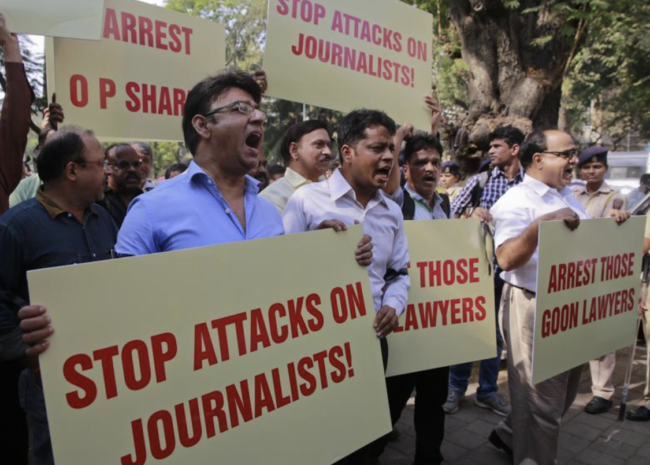Press freedom is the cornerstone of any democratic society. It informs citizens, holds governments accountable and ensures that diverse voices are seen and heard. But now, more than ever, journalists’ ability to report freely is jeopardized. Recent high-profile cases, including the prosecution of Julian Assange and the harsh imprisonment of Wall Street Journal reporter Evan Gershkovich in Russia, highlight the precarious state of free journalistic expression.
An article in The New Yorker titled “The Culture Wars Inside the New York Times” further emphasizes this. Featuring an interview with The New York Times Editor-in-Chief Joseph Kahn, the piece explains mainstream media’s struggle to balance editorial independence and institutional values in sensitive issue coverage. The article delves into the ideological clashes among journalists and editors. The piece also reflects broader societal debates over political correctness, free speech and journalistic objectivity. The article argued that the most valuable journalists write about controversial topics even if they receive backlash: “When any reporter on our [The New York Times] staff takes on something that we think is important, but that gets a certain amount of blowback, we have to come in strongly in support of that…those sorts of people are very valuable in journalism today and are going to get ahead,” said Kahn.
That is the ideal. In reality, journalists often face much harsher repercussions for addressing sensitive topics than mere backlash. These consequences range from upsetting colleagues with different opinions to being fired to, in the case of Julian Assange, getting imprisoned in various forms for fourteen years.
The case of Assange, the founder and editor-in-chief of WikiLeaks, a non-profit media organization that publishes leaked documents, exemplifies the press freedom conflict to an extreme. Assange was released in June after spending six years in a UK high-security prison cell as he made a plea deal with the US. He became a notorious and polarizing figure in journalism. Some praised him as a champion of transparency. Others condemned him as a threat to democratic safety for releasing US classified military documents regarding war crimes in Afghanistan and Iraq.
Assange’s work brought to light thousands of confidential documents. This includes the Collateral Murder Video, which showed a US helicopter attack in Baghdad that killed numerous people, including two Reuters journalists. According to The Guardian, Assange’s supporters argue that his actions exposed injustices and brought crucial information to the public eye, upholding the principles of freedom of the press and the public’s right to know what is happening worldwide.
However, Assange’s critics argue that his journalistic methods endangered lives and compromised US national security. The legal repercussions of his actions culminated in Assange pleading guilty to one count of violating the Espionage Act. This marked the first time in the act’s century-long history that a reporter has been prosecuted for journalistic acts of receiving and releasing information. This legal move sparked an intense debate about the boundaries of investigative journalism and the extent to which governments can or should control the dissemination of classified information. Adding more fuel to the controversy is the fact that Assange is not a US citizen; he is an Australian citizen who practiced journalism outside US soil.
Wall Street Journal reporter Evan Gershkovich’s case is another high-profile one. Gershkovich was arrested on charges of espionage while reporting on the war in Ukraine, in and of itself a testament to the broader crackdown on press freedom in Russia. Russian authorities apprehended Gershkovich, an American journalist with extensive experience covering Russia, in March 2023 while he was on a reporting trip in Yekaterinburg. Accused of gathering state secrets about the Russian military, he was sentenced to sixteen years in a high-security penal colony. Human rights organizations and Western governments widely condemn punishment via penal colony, especially considering the idea that the charges against Gershkovich are likely baseless and politically motivated. On August 1, Gershkovich was released in an East-West prisoner swap involving Russians held in the US and Europe in one of the most intricate negotiations since the Cold War.
The goal of a journalist is not to shy away from discussing controversial issues. Rather, it is to focus on the facts and provide readers with the most accurate and comprehensive coverage. Being a journalist, as stated by the Times’ Kahn, “requires a willingness to put your own personal views aside, and to put the facts first and reporting first and humility and understanding first.” The challenges and potential dangers that reporters face when they pursue difficult topics are a testament to the vital role that the free press plays in a democratic society and the danger of a society without it.
The risks that journalists face today are immense, and it takes a courageous person to work within them. As the great writer Oscar Wilde, who started his career as a journalist, once said, “In America, the president reigns for four years, and journalism governs forever and ever.” It is the relentless pursuit of truth that makes journalism indispensable, as reporting the facts is what safeguards democracy.






